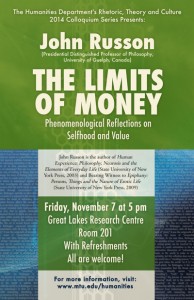The Humanities Department’s Rhetoric, Theory and Culture 2014 Colloquium series is pleased to welcome John Russon, Presidential Distinguished Professor of Philosophy at the University of Guelph (Canada). Professor Russon’s talk is entitled “The Limits of Money: Phenomenological Reflections on Selfhood and Value.” It’s being held Friday, November 7, at 5 pm, in the Great Lakes Research Centre, Room 201 (refreshments will be available). All are welcome!
Professor Russon is the author of two books on Hegel: The Self and Its Body in Hegel’s Phenomenology of Spirit (University of Toronto Press, 1997) and Reading Hegel’s Phenomenology (Indiana University Press, 2004). He is also the author of Human Experience: Philosophy, Neurosis and the Elements of Everyday Life (State University of New York Press, 2003), which was awarded the 2005 Broadview Press/Canadian Philosophical Association Book Prize. His most recent work is entitled Bearing Witness to Epiphany: Persons, Things and the Nature of Erotic Life (State University of New York Press, 2009).
Below is is the abstract for Professor Russon’s talk.
The Limits of Money: Phenomenological Reflections on Selfhood and Value
We are constitutively split between two different experiences. In the experience of “intimacy,” the differentiation that we typically presume of self from other and of fact from value is not operative; such intimacy is distinctive of the formative experience of children. This formative experience, however, precisely gives rise to the experience of “economy,” the experience, that is, of discrete subjects who work upon an alien world. Our challenge is to live in a way that acknowledges both forms of experience without resorting to the authoritative terms of either. Overall, I will argue that money, which is roughly the collectively recognized medium for recognizing the universality of exchange value, in principle misrepresents the lived nature of value. Hence, the more money defines our frame of reference (“economy”), the more the non-universalizable values that are essential to our existence (“intimacy”) are effaced.
